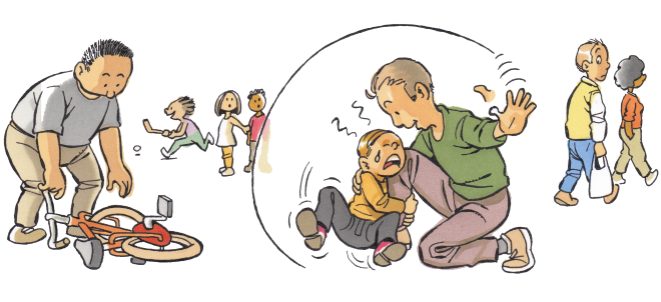Can you see it? You with your child in the park. Your child is ‘suddenly’ completely fed up with it and collapses on the spot, having a meltdown. They are now lying on the ground. And that ground is wet and dirty. You know that talking to your child won’t help right now, all you can do is be there for them (although your child may be yelling something with the clear intention that they don’t want you there at all). You hold them, or you sit right next to them, or you keep a little distance.
Experience has taught you what is best. That is, if the things you usually do work out… But maybe sometimes you act differently because of the stares of the people around you, and the possible comments, questions and advice. And then you might be tempted to try to force your child to behave or quickly move them to another place. But that’s usually not the best solution. Your child is in ‘fight/flight/freeze mode’. They can no longer think about their actions, they can only react from instinct.
What can you do at that moment? What do you do with the reactions from the people around you?
- Think of there being a ‘bubble’ around yourself and your child. They are the one needing your attention right now, not the people out there. They create their own stories, independent of what you do or say. You most likely can’t influence that and really… you don’t need to.
- When people step into your ‘bubble’, start by taking a deep breath. When they get this close, they’ve overcome a barrier, probably because they want to help you. Depending on what you hear, you can say this:
- ‘My child is experiencing sensory overload. It might take a while, but it’ll be fine.’
- ‘How nice of you to want to support me,
- … I don’t need any help right now.
- … this is what you can do for me, …’
- The person trying to help, may make a suggestion that you know won’t help, but they’re willing to help, so you can tell them what they cán do. Maybe they can put away an overturned bicycle or do other things. They may be able to ensure that loose items are cleared away (because otherwise your child may throw them). You can also ask them to stay nearby for a while.
- A difficult one: don’t alter your rules or previous statements during a tantrum, because that way you send the signal that your child can get his way by screaming or crying. ‘No, you cannot go play with Rose today’, remains ‘no’. Only focus on getting your child calmed down.
- A crying or screaming child does not need to be alarming. It’s a part of growing up. It is even necessary: tantrums are part of normal child development.



